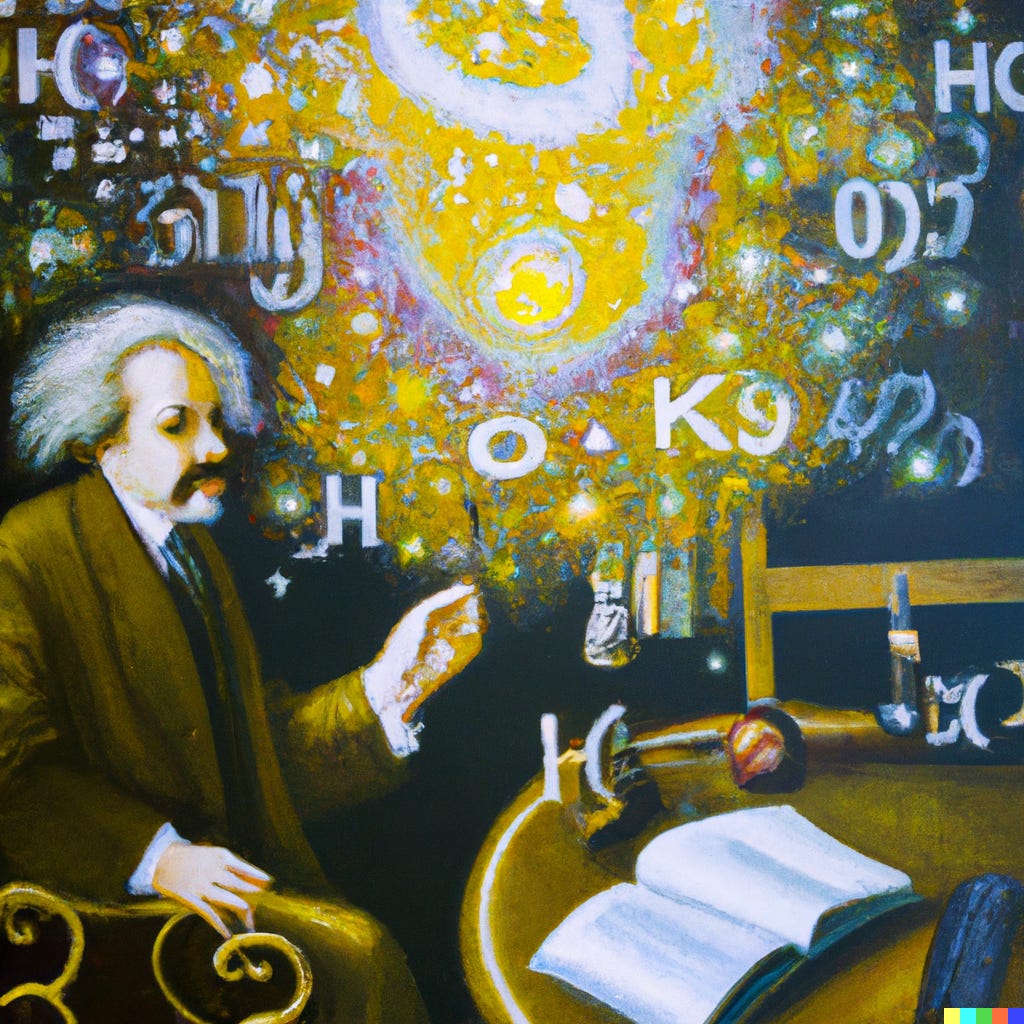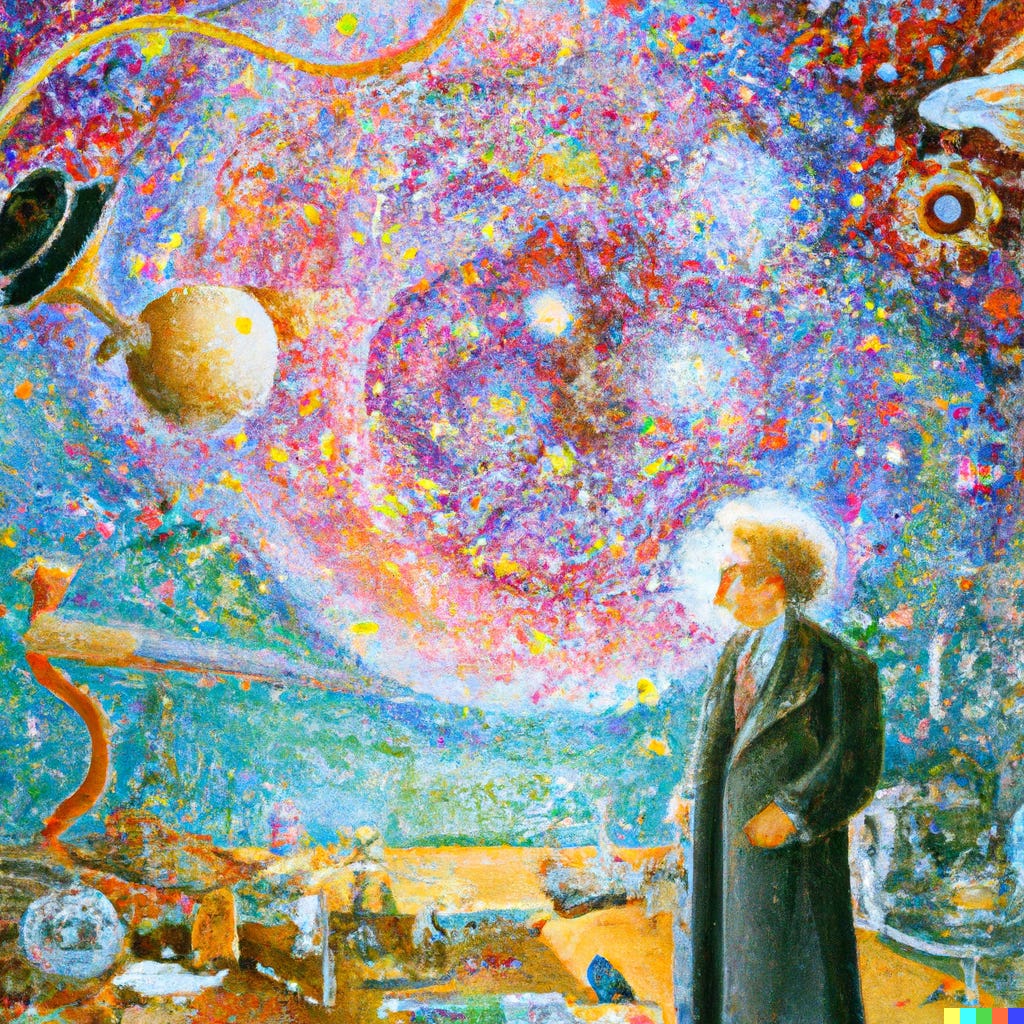Albert Einstein was a German-born theoretical physicist who is widely considered as one of the most influential scientists of the 20th century. He was born on March 14, 1879, in Ulm, Württemberg, in the Kingdom of Württemberg in the German Empire.
Einstein's parents were Hermann Einstein, a salesman and engineer, and Pauline Einstein (née Koch). Einstein spent his childhood in Munich, where his family owned a small electrical-engineering workshop. He was not a particularly gifted student in his early years, and he struggled with German, which he never fully mastered.
At the age of 17, Einstein renounced his German citizenship and moved to Switzerland to study at the Federal Institute of Technology in Zurich. He graduated in 1900 with a degree in physics and mathematics. After graduation, Einstein struggled to find a job and worked as a patent clerk in Bern, Switzerland, for several years.
In 1905, Einstein had a productive year in which he published five papers in the Annalen der Physik, a leading physics journal of the time. These papers included his theory of special relativity, which dealt with the laws of physics in moving frames of reference, and his famous equation E=mc^2, which shows the relationship between energy and mass.
In 1915, Einstein completed his theory of general relativity, which describes the laws of gravitation and the structure of space and time. The theory was based on the idea that gravity was not a force between masses, as described by Isaac Newton, but rather a curvature of spacetime caused by the presence of mass and energy.
In 1919, Einstein's theories were confirmed by the observation of a solar eclipse, which showed that starlight was deflected by the sun's gravitational field, as predicted by general relativity. This was a major triumph for Einstein and confirmed his place as a scientific genius.
In addition to his work in physics, Einstein was also a philosopher and a humanitarian. He was a pacifist and a strong opponent of nationalism and militarism, and he played a leading role in the development of the nuclear energy. However, he also had serious misgivings about the use of nuclear weapons, and he devoted much of his later life to activism for world peace.
Einstein was awarded the Nobel Prize in Physics in 1921 for his discovery of the law of the photoelectric effect, which showed that light consists of individual particles and not just waves. This work laid the foundation for the development of quantum mechanics, one of the most important branches of modern physics.
Einstein immigrated to the United States in 1933 to escape Nazi persecution of Jews in Germany. He settled in Princeton, New Jersey, and became a professor of physics at Princeton University. He continued to work on the unification of the laws of physics, but he was never able to achieve his goal.
Einstein died on April 18, 1955, at the age of 76. He left behind a legacy of scientific and humanitarian achievements that continue to influence the world today.
In summary, Albert Einstein was a brilliant physicist and mathematician who made pioneering contributions to our understanding of the universe. His theories of special and general relativity and his equation E=mc^2 transformed the field of physics and had a profound impact on the world. He was also a passionate advocate for peace and human rights, and his ideas continue to inspire and influence people all over the world.
Albert Einstein is widely regarded as one of the greatest scientists of the 20th century, and his contributions to our understanding of the universe have had a profound impact on the fields of physics and astronomy. However, his work did not stop after his death in 1955. In fact, Einstein's legacy has continued to be expanded upon by generations of scientists and researchers who have built upon his ideas and theories.
Here are a few examples of how Einstein's contributions were developed after his death:
Further validation of special relativity: Einstein's theory of special relativity, which outlines the relationship between space and time, has been further validated through various experiments and observations. These include tests of the equivalence of inertial frames, the constancy of the speed of light, and the concept of time dilation.
Unification of quantum mechanics and general relativity: One of the major challenges in physics today is to find a theory that unifies quantum mechanics and general relativity. Einstein spent the latter part of his life trying to find a unified theory, but was unsuccessful. However, his work continues to inspire and guide modern efforts to find a theory of everything.
Study of black holes: Einstein's theory of general relativity provided a framework for understanding the behavior of black holes. Since his death, the study of black holes has become a major area of research in astrophysics, with numerous black holes discovered and their properties studied in detail.
Big Bang theory: The Big Bang theory, which explains the origin of the universe, was developed after Einstein's death. Einstein's theory of general relativity provided a foundation for the development of this theory, which has since been confirmed through observations of the cosmic microwave background radiation and the large scale structure of the universe.
One of the key areas where Einstein's work has been expanded upon is in the field of cosmology. After his death, scientists continued to study the behavior of the universe and were able to build upon Einstein's theories of general relativity and the structure of the cosmos. For example, the discovery of dark matter and dark energy has expanded our understanding of the universe and has shown that Einstein's ideas about the behavior of matter and energy were not complete. This has led to the development of new theories that incorporate dark matter and dark energy, and has provided new insights into the origins and evolution of the universe.
One of the most significant developments was the confirmation of Einstein's theory of general relativity through observations of gravitational waves. In 2015, the Laser Interferometer Gravitational-Wave Observatory (LIGO) announced the first direct detection of gravitational waves, which were produced by the collision of two black holes. This discovery confirmed Einstein's predictions made in his theory of general relativity.
Another area where Einstein's work has been expanded upon is in the field of quantum mechanics. Einstein was a major contributor to the development of this field, but after his death, scientists continued to study the strange and seemingly paradoxical behavior of subatomic particles. They were able to build upon Einstein's ideas and develop new theories that better explain the behavior of particles at the quantum level, including the theory of quantum field theory.
Einstein's work on special and general relativity has also continued to be studied and expanded upon after his death. For example, scientists have developed new theories of gravity, such as the theory of gravitation known as loop quantum gravity, which attempt to reconcile general relativity with quantum mechanics. Additionally, researchers have used Einstein's theories to study the behavior of black holes and other celestial objects, leading to new insights into the nature of space and time.
Finally, Einstein's work has also had a major impact on other fields, such as computer science and engineering. For example, Einstein's theories of relativity have been used to develop GPS systems, which rely on the precise measurement of time and distance in order to provide accurate navigation information.
In conclusion, Einstein's contributions to our understanding of the universe have been expanded upon and built upon by generations of scientists after his death. His legacy continues to influence and shape our understanding of the cosmos, and his ideas continue to inspire new research and discoveries.






